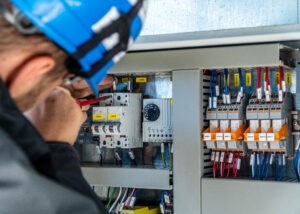An EICR Certificate is a certificate that summarises the state, safety, and calibre of all electrical installations and fixtures in your property, also known as an Electrical Installation Condition Report.
All new and existing tenants must have an EICR Certificate as of April 2021. This article will go over important details that will help you comprehend the value of having an EICR certificate, what goes into getting one, and what happens if an EICR inspection is not performed as necessary.
EICR Certificate inspections guarantee the security of both rental properties and their occupants. There is still a minority of landlords who do not adhere to the aforementioned protocol and make sure that the finest electrical practices are upheld on their properties, despite the fact that the majority already do.
Continue reading to learn important details that will assist you in securing your property and ensuring that it complies with UK regulations.
What transpires:
After a complete examination of the property’s electrical system, an EICR Certificate is generated. This includes inspecting the fuse box, sockets, wiring, as well as other components that fall under the scope of the inspection. Getting an EICR Certificate is the way to go whether you are a tenant, a business owner, or just want to make sure your home is secure.
A residential property is typically insured by an EICR for 10 years, whereas commercial or privately rented premises are only covered for 5. EICR inspections should be conducted yearly in restaurants and hotels.
The procedure is straightforward, and assistance is available if needed. If you visit our website for more information and to request an estimate, we at MyConstructor can instantly connect you to the appropriate tradesperson.
What is the time frame?
The duration of an EICR examination varies on the size and state of the property. The timeframe will inevitably be prolonged if the property has a complicated electrical system, numerous circuits, and potential problems. Small apartments typically require an hour or less to investigate, however bigger residences may need three to four hours.
What is the price of an EICR Certificate?
Several factors affect how much an EICR Certificate costs.
Location: The price of the EICR certificate will be influenced by the property’s location. Prices will be higher in London and the adjacent South-East regions than elsewhere in the UK.
The size of the property: Costs associated with EICR Certificates will increase as a result of larger properties typically having more electrical fixtures.
The property’s age: inspecting newer homes is simpler and quicker. The procedure of checking them will take longer if the building is older and has more out-of-date electrical fixtures, which will raise the overall expenditures.
The scope of the inspection as a whole: Additional charges may be required depending on the condition of the property. At the conclusion of the inspection, additional recommendations or proposed corrective action may be included in these.
Cost of a domestic versus commercial EICR certificate
The price of an EICR Certificate will change depending on the kind and dimensions of your property. The expense of inspecting commercial premises is typically higher than residential ones. The general size disparity and more intricate electrical installations are to blame for this. We provide competitive market pricing at MyConstructor.
The cost of an EICR Certificate is typically as follows:
Cost of an EICR Certificate for a Studio: from £69
Cost of an EICR Certificate for a 1-bedroom property: £89
Cost of an EICR Certificate for a 2-bedroom property: £99
Cost of an EICR Certificate for a 3-bedroom property: £99
When ordering their EICR Certificate in bulk from us, landlords who own numerous properties are able to receive savings from MyConstructor. It’s also crucial to keep in mind that after you receive your individual quote from our website, our rate will include the cost of the VAT, so the price you see will be the whole price you must pay. There are no unstated fees.
Is it possible to fail an EICR inspection?
If the engineer is dissatisfied with the quality of the electrical fixtures in your property, you could fail an EICR inspection. They would mark the installations as “unsatisfactory,” then make suggestions for the necessary adjustments.
Nearly half of all home fires in the UK are started by electrical failures, which can result in serious catastrophes. These startling figures demonstrate how seriously we will treat any violations of the law and the EICR safety standards. Before moving into the property, you have the right to an EICR Certificate, and it is your duty as the landlord to produce one.
The enforcement of these safety standards must be regulated by local authorities. Additionally, they have the power to impose civil fines for non-compliance, which can be as high as £30,000 per violation of these rules. Following EICR requirements is crucial for landlords; failing to do so puts you at danger of both financial and legal repercussions. Additionally, it’s possible that the majority of insurance companies won’t want to work with you or may reject claims relating to a failure to comply with EICR requirements.
Even if a property and its internal installations are brand new or if you have never had a problem with them, compliance with health and safety laws is required. This does not imply that the home is secure or that its electrical fixtures meet the requirements set forth by UK law.
A vital and trustworthy approach to ensure that your house, rented property, or business is adhering to the required safety regulations is to obtain an EICR Certificate. Contact MyConstructor right away to start the process of making sure your property is as secure as it can be. Every step of the process, we’ll help you and support you while offering you the best market prices on EICR Certificates.
